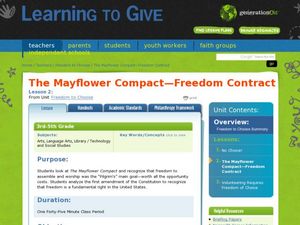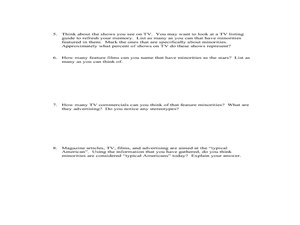Curated OER
The Supremes
High schoolers discuss steps cases go through to reach Supreme Court, examine Bill of Rights, and rank rights in order of importance to them. Students then research Supreme Court case dealing with one of first ten amendments, and write...
Curated OER
First Amendment Guarantee of Free Speech (Senior, Social Studies)
High schoolers receive a list of banned books from which they choose one to read. They read their chosen book and write a paper that includes a discussion of the First Amendment and its guarantees and the reason(s) why they believe their...
Curated OER
Fairy Tails Can Show Due:It can happen for you, If you play your part.,
Learners view a Reader's Theater focusing on the story of Goldilocks and the Three Bears. The story is used as a springboard into a videotaped mock trial of Gold E. Locks developed by the American Board of Trial Advocates (ABOTA). They...
Curated OER
Arrests and Investigatory Stops
Students define arrest and detainment, examine hypothetical situations to determine if warrantless arrest/detainment is reasonable based on information available to police, discuss differences between hunch, suspicion, reasonable...
Curated OER
We Have Rights
Students investigate the concept of having rights as citizens. In this citizenship lesson, students examine the rights that are given to citizens of the United States in the Bill of Rights. They draw pictures of eight of their...
Curated OER
The Mayflower Compact: Freedom Contract
Students read historical documents. In this freedom lesson, students discuss the freedoms they have, such as whom to play with at recess, and how the pilgrims must have felt when they landed in America. Students read The Mayflower...
Curated OER
Presidents
Students identify the qualities needed to become President of the United States. Using the internet, they discover the differences in character of past presidents and draw conclusions about their time in office. They relate a piece of...
Curated OER
A Constitution for Alaska
Pupils read sections cited from the Governing Alaska unit. They discuss factors that made Alaskans push for statehood. They view video A Constitution for Alaska.
Curated OER
The Impact
Learn about the destruction of the rainforest by analyzing statistics. Young learners make an original line graph showing destruction in the rainforest. Additional activities include making a collage, sequencing Dr. Seuss' The...
Curated OER
Living News: Classroom Materials
Students explore controversial current events. In this Bill of Rights lesson, students research selected issues and examine the issues from different perspectives. Students script and record news stories that feature their findings.
Curated OER
Bill of Rights
US history classes explore constitutional rights as they relate to court cases involving teens. Your class must already be familiar with the Bill of Rights before beginning this series of exercises. In preparation for a debate-style...
Alabama Department of Archives and History
Alabama's Steps to Statehood
To demonstrate their understanding of the steps Alabama took to become a state, groups create a poster that identifies what the United States Constitution and the Northwest Ordinance required of a territory to become a state.
Minnesota Center for Community Legal Education
Minnesota v. Hershberger
Freedom of religion has been a controversial, yet fundamental, tenet of the United States since even before the nation's birth. In a well-constructed lesson, the class compares the Minnesota Constitution to the US Constitution as a means...
Curated OER
The Role of the Executive Branch in the Lawmaking Process
Students examine Article I, Section 7, and Article II, Sections 2 and 3, of the U.S. Constitution, explain the president's role in the lawmaking process, and define the term veto.
Judicial Learning Center
American Equality Milestones
Has equality always existed as an unalienable right in the United States? Use this worksheet to chronicle the history and progression of equality in major documents and speeches throughout American history. The graphic organizer asks...
Center for Civic Education
Citizenship Schools and Civic Education During the Civil Rights Movement and in the Present
Your young historians will discover the importance that citizenship education has played in the social progress of the United States as they learn about early efforts to discourage African Americans from voting in the 1960s.
ProCon
Right to Health Care
Is health care a right or a privilege? Scholars review pro and con arguments to decide if all Americans should have the right to health care. They also watch informative videos and review information on the United States and...
Curated OER
The Virginia Plan and the New Jersey Plan: Student Worksheet
These guided reading questions accompany several websites on the development of the US Constitution. While some of the links have changed, they are still accessible. History or government classes benefit from reading primary source...
iCivics
Wanted: A Just Right Government
What type of government did American colonists gain and seek after gaining their independence after the Revolutionary War? Here is lesson that will guide your young learners through the new nation's progression from the Articles of...
Deliberating in a Democracy
Crime and Punishment
Should the United States ban the death penalty? Scholars use real-life examples of criminal activity to come to their own conclusions on the death penalty. Primary source documents, as well as video clips, open the issue of capital...
Curated OER
Minorities in Mainstream American Society
So many people fought for Civil Rights in the United States. Read about the Civil Rights Act of 1964, and discuss what the act guarantees. Then pass out a slew of magazines and encourage them to observe how often minorities appear in...
School Improvement in Maryland
Supreme Court Case Overview I
As part of a study of the 14th Amendment to the United States Constitution, class members examine four Supreme Court decisions—Gitlow v. New York, Mapp v. Ohio, Gideon v. Wainwright, and Griswold v. Connecticut—that incorporated the due...
Global Oneness Project
The Nature of Happiness
The U.S. Constitution states that the pursuit of happiness is an inalienable right. The United Nations' Global Happiness Index ranks countries according to the happiness of its citizens. As part of a discussion of the nature of...
CommonCoreSheets.com
The Civil Rights Movement Timeline
Using this simple worksheet, your learners will have the opportunity to practice reading timelines while learning about key events during the civil rights movement in the United States.

























